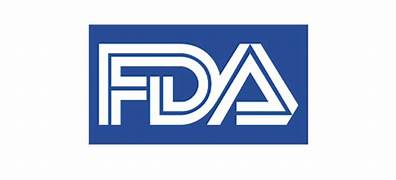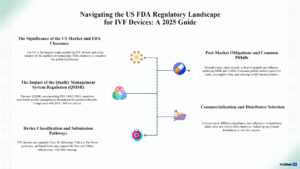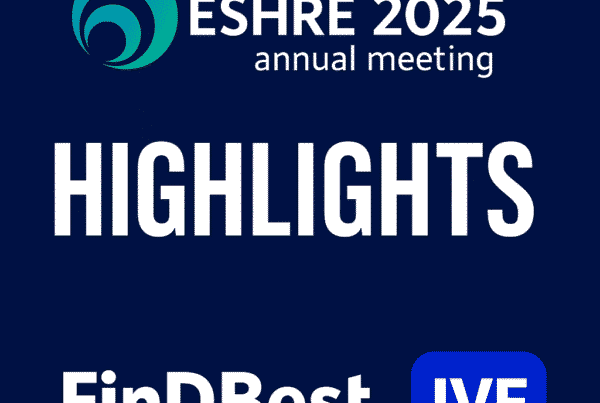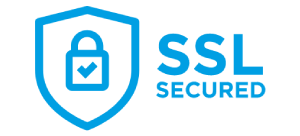Mastering the FDA Pathway: 2025 Guide for IVF Innovators
This post launches our new Regulatory Affairs series, giving IVF innovators region-by-region roadmaps to regulatory clearance.
1. Why the U.S. still matters
- Largest single IVF-device market (~US $1.3 B).
- First adopters of AI-enabled lab tech.
- FDA clearance is the gold stamp for global distributors.
2. Quality Management System Regulation (QMSR) — NEW
In February 2024 FDA finalized the Quality Management System Regulation (QMSR), replacing the old 21 CFR 820 QS Regulation. QMSR incorporates ISO 13485:2016 by reference and mandates risk-based quality management across the entire product life-cycle, not only at initial audit fda.govfederalregister.gov.
What it means for you
- Align your QMS with ISO 13485 before design-freeze.
- Maintain documented risk files that link hazards to design controls.
- Expect FDA inspectors to sample post-market surveillance activities during routine audits.
3. Classify your IVF device
| Typical IVF Product | FDA Class | Product Code | Pathway |
| Embryo-transfer catheter | II | MQF | 510(k) |
| Culture media / oil | II (special controls) | MQL | 510(k) |
| Time-lapse incubator | II | MNB | De Novo → 510(k) |
| AI embryo-scoring software | II (SaMD) | QDQ | De Novo / 510(k) |
| Laser-assisted hatching | III | LAS | PMA |
| Combination products (e.g., media + growth factor) | Device/biologic | — | PMA or BLA / CBER-CDRH joint review |
Tip – No predicate? File a De Novo to create one; subsequent models may follow the 510(k) route.
4. Submission routes & 2025 fees*
| Route | Use-case | Avg. FDA days** | FY 2025 Fee | FY 2024 Fee (ref) |
| 510(k) | Predicate exists | 124 | $25,347 | $21,760 |
| De Novo | First-of-kind, moderate risk | 6–9 mo | $132,874 | $114,836 |
| PMA | High-risk / combo | 12–18 mo | $483,560 | $417,973 |
| Establishment registration | Annual | — | $9,280 | $7,653 |
*Fees published each August; confirm current rates before submitting fda.govfederalregister.gov.
**MDUFA V decision goals.
5. Regulatory checklist (concept → clearance)
- Determine regulation & product code
- Appoint U.S. Agent & register establishment (FDORA eSTAR portal).
- Implement QMSR (ISO 13485-aligned).
- Generate technical file
- UDI & GUDID
- Labeling / IFU – reflect cleared indications only.
- Submit with eSTAR (now compulsory for 510(k), De Novo from Oct 2025) fda.gov.
- Interactive review – respond rapidly to RTA/AI letters.
- Post-market
- MDR, CAPA, and—new for AI/ML devices—continuous performance monitoring & real-world accuracy reports via FDA’s Digital Health Center of Excellence.
6. Common IVF pitfalls & fixes
| Pitfall | Impact | Fix |
| Predicate outside ART scope | NSE decision | Match intended use (embryo vs IUI). |
| Incomplete embryo-toxicity data | AI hold | Include mouse-embryo assay + endotoxin testing. |
| Missing SaMD documentation | RTA refusal | Provide software traceability & cybersecurity plan (FDA Cybersecurity Guidance) fda.gov. |
| Forgetting GUDID upload | Compliance warning | Upload DI within 60 days; link production IDs for kits. |
7. Accelerators (and their new limits)
| Tool | Still works? | 2025 Notes |
| Q-Sub (Pre-Submission) | ✔ | FDA now issues written feedback first; meetings reserved for complex issues. |
| Third-Party 510(k) Review | ⚠️ | Not eligible for AI/ML software or most combination products (see product codes QKQ, QIH) accessdata.fda.govaccessdata.fda.gov. |
| Special Controls | ✔ | ART media & catheters covered—leverage to avoid clinical trials. |
| Parallel FDA/CMS Review | ✔ | Worth it for AI diagnostics needing reimbursement. |
8. Commercialisation after clearance
- Cybersecurity & HIPAA – connected devices must ship with SBOMs and meet PATCH-within-30-days expectation.
- Marketing claims – new FTC rule bars “clinically proven” language without FDA-reviewed evidence.
- State regulations – California (SB 546) and Texas (HB 3168) now require adverse-event reporting at clinic level; distributors must support customers accordingly.
- Distribution – choose reps who:
- Know 510(k)/UDI nuances.
- Provide field service logs aligned to QMSR.
- Have reach in the 20 largest U.S. IVF clinics.
9. Key takeaways
- QMSR is live—ISO 13485 compliance is now mandatory.
- Most IVF devices stay in Class II → 510(k), but AI tools may need De Novo.
- UDI/GUDID submission within 60 days is non-negotiable.
- AI/ML devices carry extra post-market monitoring obligations.
- Third-Party review no longer speeds AI/ML devices—plan timelines accordingly.
- After clearance, success hinges on reg-literate distributors—find them on FinDBest IVF.
Ready to tackle the FDA and secure top-tier U.S. partners?
Send us an email at info@findbestivf.com to get a promo code to find distributors for the USA market.
Next in the series → “China’s NMPA Pathway for IVF Devices.”








